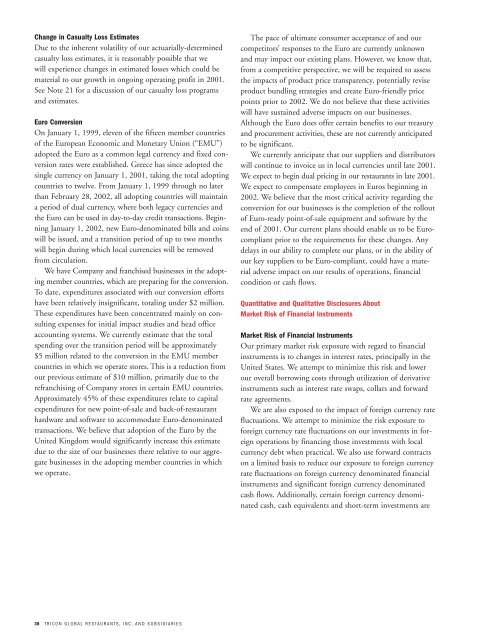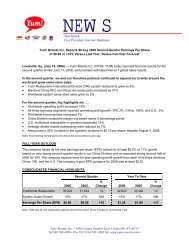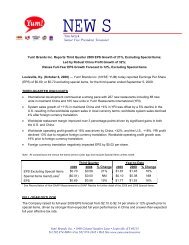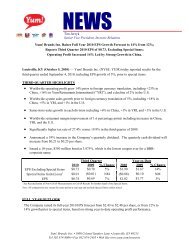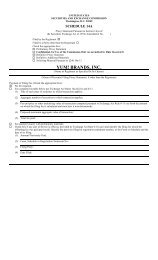2000 Annual Report - Yum!
2000 Annual Report - Yum!
2000 Annual Report - Yum!
Create successful ePaper yourself
Turn your PDF publications into a flip-book with our unique Google optimized e-Paper software.
Change in Casualty Loss Estimates<br />
Due to the inherent volatility of our actuarially-determined<br />
casualty loss estimates, it is reasonably possible that we<br />
will experience changes in estimated losses which could be<br />
material to our growth in ongoing operating profit in 2001.<br />
See Note 21 for a discussion of our casualty loss programs<br />
and estimates.<br />
Euro Conversion<br />
On January 1, 1999, eleven of the fifteen member countries<br />
of the European Economic and Monetary Union (“EMU”)<br />
adopted the Euro as a common legal currency and fixed conversion<br />
rates were established. Greece has since adopted the<br />
single currency on January 1, 2001, taking the total adopting<br />
countries to twelve. From January 1, 1999 through no later<br />
than February 28, 2002, all adopting countries will maintain<br />
a period of dual currency, where both legacy currencies and<br />
the Euro can be used in day-to-day credit transactions. Beginning<br />
January 1, 2002, new Euro-denominated bills and coins<br />
will be issued, and a transition period of up to two months<br />
will begin during which local currencies will be removed<br />
from circulation.<br />
We have Company and franchised businesses in the adopting<br />
member countries, which are preparing for the conversion.<br />
To date, expenditures associated with our conversion efforts<br />
have been relatively insignificant, totaling under $2 million.<br />
These expenditures have been concentrated mainly on consulting<br />
expenses for initial impact studies and head office<br />
accounting systems. We currently estimate that the total<br />
spending over the transition period will be approximately<br />
$5 million related to the conversion in the EMU member<br />
countries in which we operate stores. This is a reduction from<br />
our previous estimate of $10 million, primarily due to the<br />
refranchising of Company stores in certain EMU countries.<br />
Approximately 45% of these expenditures relate to capital<br />
expenditures for new point-of-sale and back-of-restaurant<br />
hardware and software to accommodate Euro-denominated<br />
transactions. We believe that adoption of the Euro by the<br />
United Kingdom would significantly increase this estimate<br />
due to the size of our businesses there relative to our aggregate<br />
businesses in the adopting member countries in which<br />
we operate.<br />
38 TRICON GLOBAL RESTAURANTS, INC. AND SUBSIDIARIES<br />
The pace of ultimate consumer acceptance of and our<br />
competitors’ responses to the Euro are currently unknown<br />
and may impact our existing plans. However, we know that,<br />
from a competitive perspective, we will be required to assess<br />
the impacts of product price transparency, potentially revise<br />
product bundling strategies and create Euro-friendly price<br />
points prior to 2002. We do not believe that these activities<br />
will have sustained adverse impacts on our businesses.<br />
Although the Euro does offer certain benefits to our treasury<br />
and procurement activities, these are not currently anticipated<br />
to be significant.<br />
We currently anticipate that our suppliers and distributors<br />
will continue to invoice us in local currencies until late 2001.<br />
We expect to begin dual pricing in our restaurants in late 2001.<br />
We expect to compensate employees in Euros beginning in<br />
2002. We believe that the most critical activity regarding the<br />
conversion for our businesses is the completion of the rollout<br />
of Euro-ready point-of-sale equipment and software by the<br />
end of 2001. Our current plans should enable us to be Eurocompliant<br />
prior to the requirements for these changes. Any<br />
delays in our ability to complete our plans, or in the ability of<br />
our key suppliers to be Euro-compliant, could have a material<br />
adverse impact on our results of operations, financial<br />
condition or cash flows.<br />
Quantitative and Qualitative Disclosures About<br />
Market Risk of Financial Instruments<br />
Market Risk of Financial Instruments<br />
Our primary market risk exposure with regard to financial<br />
instruments is to changes in interest rates, principally in the<br />
United States. We attempt to minimize this risk and lower<br />
our overall borrowing costs through utilization of derivative<br />
instruments such as interest rate swaps, collars and forward<br />
rate agreements.<br />
We are also exposed to the impact of foreign currency rate<br />
fluctuations. We attempt to minimize the risk exposure to<br />
foreign currency rate fluctuations on our investments in foreign<br />
operations by financing those investments with local<br />
currency debt when practical. We also use forward contracts<br />
on a limited basis to reduce our exposure to foreign currency<br />
rate fluctuations on foreign currency denominated financial<br />
instruments and significant foreign currency denominated<br />
cash flows. Additionally, certain foreign currency denominated<br />
cash, cash equivalents and short-term investments are


